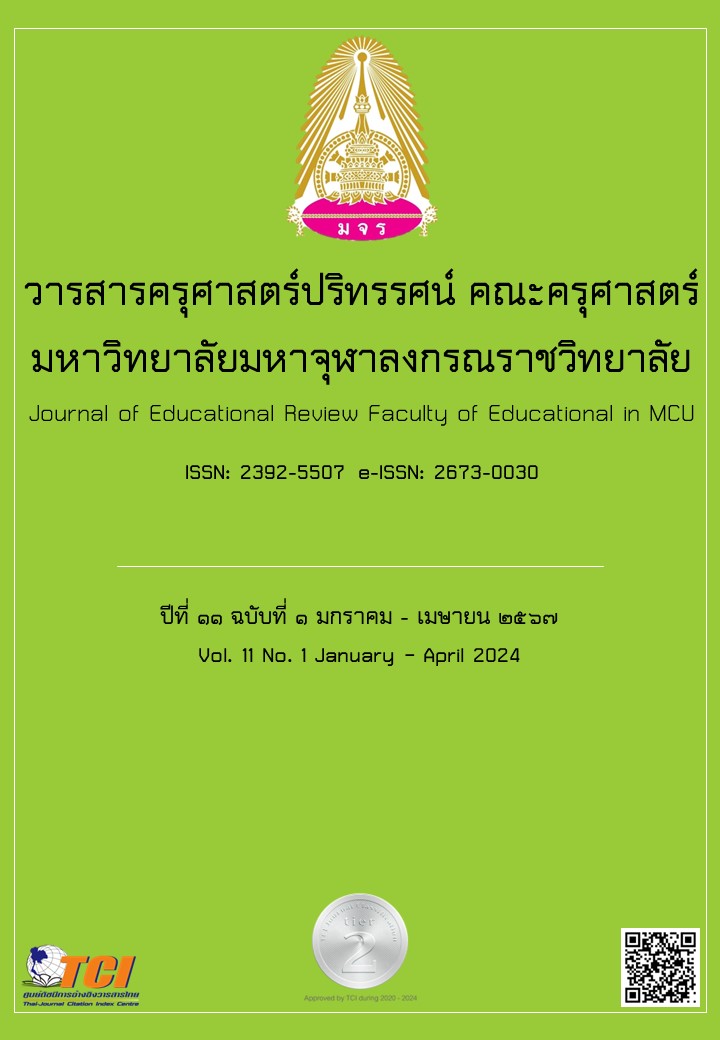SOCIAL STUDIES LEARNING MANAGEMENT TO DEVELOP STUDENT COMPETENCIES IN THE 21ST CENTURY
Main Article Content
Abstract
This academic article is about the learning management of social studies to develop learners’ competencies in the 21st century. The instructors have to know how to integrate innovation with technology to promote higher-order thinking by using resources, knowledge, and learning centers in the community. They emphasize projects, discussions beyond school learning, learning by doing, using quality technology and resources, and being able to work as a team. Learning management in social studies in the 21st century is to study the existing theory and further through technology with various methods. Religions, moralities, and ethics should be self-studied and practiced in established situations by considering learners' abilities. It might be the Yonisomanasikara method, the Four Noble Truths, or the Threefold Training. Civics, culture, and social life must be self-studied. Learners have to participate in the learning activities. They have to be responsible, like exploring and practicing. They are able to find the answer and summarize the explicit knowledge. They respect each other’s rights and duties and work with each other happily through learning, emphasizing affective development, role play, and situational confrontation. Learners have to adapt economics to their daily lives. They have to practice through the CIPPA model, inquiry-based learning, and problem-based learning to let them solve the problems creatively. They are able to accept other people’s opinions and dare to express themselves. They know how to spend, save money, and buy products and limited services wisely, getting the most benefit. Learners have to do research to solve the problems using technology. They have higher-order thinking and communicate creatively. Instructors manage learning activities along with the Magic If concept, historical process, syndicate, and CRP process. Learners adore the nation, religion, and HM the King. They have good willingness, learning inquiry, and living sufficiently. They realize and acknowledge the importance of national and local history. Learners study geography by acknowledging and understanding natural and man-made phenomena. They can use geographic tools. They have higher-order thinking and good attitudes towards natural resources and environmental conservation. They adapt their geographic knowledge through cooperative and 4MAT-based learning processes.
Article Details

This work is licensed under a Creative Commons Attribution-NonCommercial-NoDerivatives 4.0 International License.
ทัศนะและความคิดเห็นที่ปรากฏในบทความในวารสารฉบับนี้ถือเป็นความรับผิดชอบของผู้เขียนบทความนั้นเพียงผู้เดียว และไม่ถือเป็นทัศนะและความรับผิดชอบของกองบรรณาธิการ
กองบรรณาธิการขอสงวนสิทธิ์ในการคัดเลือกบทความลงตีพิมพ์และจะแจ้งให้เจ้าของบทความทราบหลังจากผู้ประเมินบทความตรวจอ่านบทความแล้ว
ต้นฉบับที่ได้รับการตีพิมพ์ในวารสารครุศาสตร์ปริทรรศน์ คณะครุศาสตร์ มหาวิทยาลัยมหาจุฬาลงกรณราชวิทยาลัย ถือเป็นกรรมสิทธิ์ของคณะครุศาสตร์ มหาวิทยาลัยมหาจุฬาลงกรณราชวิทยาลัย ห้ามนำข้อความทั้งหมดหรือบางส่วนไปพิมพ์ซ้ำ เว้นเสียแต่ว่าจะได้รับอนุญาตจากมหาวิทยาลัยฯ เป็นลายลักษณ์อักษร
References
ชรินทร์ มั่งคั่ง. (2561). องค์ความรู้หลักสูตรและการสอนสังคมศึกษา. กรุงเทพมหานคร: สำนักพิมพ์จุฬาลงกรณ์มหาวิทยาลัย.
ชัยวัฒน์ สุทธิรัตน์. (2552). 80 นวัตกรรมการจัดการเรียนรู้ที่เน้นผู้เรียนเป็นสำคัญ. กรุงเทพมหานคร: แดแน็กซ์อินเตอร์คอร์ปอร์เรชั่น.
ฐากร สิทธิโชค และวิทวัส นิดสูงเนิน. (2564). ครูสังคมศึกษากับการจัดการเรียนรู้ในยุคดิจิทัล. วารสารศึกษาศาสตร์ มหาวิทยาลัยทักษิณ. 21(1). 18-31.
ณดล โตไทยะ และลักขณา สริวัฒน์. (2565). การพัฒนาโปรแกรมฝึกการคิดแบบโยนิโสมนสิการเพื่อพัฒนาการเห็นคุณค่าในตนเองของนักเรียนระดับมัธยมศึกษาตอนต้น. วารสาร มจร การพัฒนาสังคม. 7(1). 263-280.
ณัฏฐ์วัฒน์ อนันตะสุข และคณะ. (2564). มโนทัศน์ว่าด้วยการสอนภูมิศาสตร์แนวใหม่เพื่อการรู้เรื่อง ภูมิศาสตร์ของนักเรียน ระดับการศึกษาขั้นพื้นฐาน. วารสารศึกษาศาสตร์ มหาวิทยาลัยมหาสารคาม. 15(2). 7-21.
ทิศนา แขมมณี. (2554). ศาสตร์การสอน: องค์ความรู้เพื่อการจัดกระบวนการเรียนรู้ที่มีประสิทธิภาพ. กรุงเทพมหานคร: สำนักพิมพ์จุฬาลงกรณ์มหาวิทยาลัย.
ทิศนา แขมมณี. (2560). ศาสตร์การสอน : องค์ความรู้เพื่อการจัดกระบวนการเรียนรู้ที่มีประสิทธิภาพ. พิมพ์ครั้งที่ 21. กรุงเทพมหานคร: สำนักพิมพ์จุฬาลงกรณ์มหาวิทยาลัย.
ธนกร เนตรวงษ์. (2564). การพัฒนากิจกรรมการเรียนรู้แบบซิปปา เรื่องอาณาจักรอยุธยาและธนบุรี ชั้นประถมศึกษาปีที่ 5. วารสาร มหาวิทยาลัยราชภัฏมหาสารคาม. 15(3): 69-79.
นุชจรี ลอยหา, พักตร์วิภา โพธิ์ศรี และอุทิศ บำรุงชีพ. (2563). แนวทางการจัดการศึกษาเพื่อการพัฒนาความฉลาดทางดิจิทัลบนฐานความคิดหลักเศรษฐกิจพอเพียง. วารสารการศึกษาและพัฒนาสังคม. 15(2). 410-420.
ปุณณวัช ทัพธวัช และอรพิณ ศิริสัมพันธ์. (2562). การพัฒนารูปแบบการจัดการเรียนรู้ภูมิศาสตร์โดยบูรณาการหลักนิยาม 5 เพื่อพัฒนามโนทัศน์ทางภูมิศาสตร์ และจิตสำนึกการอนุรักษ์ทรัพยากรธรรมชาติของนักเรียนชั้นมัธยมศึกษาตอนต้น. วารสาร Veridian E-Jouranl มหาวิทยาลัยศิลปากร. 12(3). 550-571.
พระวิระพันธ์ ติกฺขปญโญ (เสียงเย็น) และคณะ. (2561). การจัดการเรียนการสอนตามหลักไตรสิกขาเรื่องพุทธประวัติ นักเรียนชั้นประถมศึกษาปีที่ 4 โรงเรียนบ้านเหล่าหมี จังหวัดมุกดาหาร. วารสารครุศาสตร์ปริทรรศน์ คณะครุศาสตร์ มหาวิทยาลัยวิทยาลัยมหาจุฬาลงกรณราชวิทยาลัย. 5(1). 147-156.
พูลศักดิ์ หอมสมบัติ และประยูร แสงใส. (2564). การจัดการเรียนรู้สังคมศึกษาในศตวรรษที่ 21. วารสาร มจร อุบลปริทรรศน์. 6(3). 825-840.
ไพฑูรย์ สินลารัตน์ และคณะ. (2550). สัตตศิลา หลักเจ็ดประการสำหรับ: การเปลี่ยนผ่านการศึกษาเข้าสู่ยุคเศรษฐกิจฐานความรู้. กรุงเทพมหานคร: โรงพิมพ์แห่งจุฬาลงกรณ์มหาวิทยาลัย.
เรวดี ศรีสุข. (2562). การประยุกต์ใช้ทฤษฎีการเรียนรู้แบบร่วมมือ (Co-operative learning) ในการออกแบบจัดการเรียนการสอน. วารสารวิทยาลัยพยาบาลบรมราชชนนี สุพรรณบุรี. 2(1). 5-16.
วรรณิภา เฉลิมหมู่ และคณะ. (2565). แนวทางการพัฒนาการจัดการเรียนการสอนวิชาวิทยาศาสตร์ โดยเน้นผู้เรียนเป็นสำคัญตามหลักอริยสัจ 4 ของครูสังกัดสำนักงานเขตพื้นที่มัธยมศึกษา เขต 3 จังหวัดพระนครศรีอยุธยา. วารสารครุศาสตร์ปริทรรศน์ คณะครุศาสตร์ มหาวิทยาลัยวิทยาลัยมหาจุฬาลงกรณราชวิทยาลัย. 9(1). 186-196.
วรุตม์ โคตรคำหาญ และรุ่งทิวา จันทน์วัฒนวงษ์. (2564). ผลการจัดการเรียนรู้ด้วยกระบวนการเผชิญสถานการณ์ต่อความสามารถในการคิดแก้ปัญหาและผลสัมฤทธิ์ทางการเรียนสาระเศรษฐศาสตร์ของนักเรียนชั้นมัธยมศึกษาปีที่ 2. Journal of Buddhist Education and Research: JBER. 7(3). 124-134.
วิชัย วงษ์ใหญ่ และมารุต พัฒผล. (2563). Creative team Learning ทีมการเรียนรู้สร้างสรรค์. กรุงเทพมหานคร: ศูนย์ผู้นำนวัตกรรมหลักสูตรและการเรียนรู้ มหาวิทยาลัยศรีนครินทรวิโรฒ.
วิภาพรรณ พินลา และวิภาดา พินลา. (2566). การจัดการเรียนรู้สังคมศึกษาในยุคศตวรรษที่ 21. พิมพ์ครั้งที่ 3. กรุงเทพมหานคร: สำนักพิมพ์จุฬาลงกรณ์มหาวิทยาลัย.
ศุจีภรณ์ แก้วเทพ. (2562). การศึกษาประสบการณ์ด้านการจัดการเรียนรู้วิชาประวัติศาสตร์ของครูระดับประถมศึกษาในบริบทอาเซียน. วารสารศิลปะศาสตร์ มหาวิทยาลัยแม่โจ้. 7(1). 39-51.
ศุภณัฐ พานา. (2560). การพัฒนารูปแบบการเรียนการสอนประวัติศาสตร์ ตามแนวคิดกระบวนการสืบสอบแสวงหาความรู้เป็นกลุ่มร่วมกับแนวคิด Magic if เพื่อส่งเสริมทักษะการคิดทางประวัติศาสตร์ และการรับรู้ความรู้สึกทางประวัติศาสตร์ของนักเรียนระดับมัธยมศึกษาตอนปลาย. ดุษฎีนิพนธ์ครุศาสตรดุษฎีบัณฑิต จุฬาลงกรณ์มหาวิทยาลัย.
สมศักดิ์ ดลประสิทธิ์. (2564). แนวทางการจัดการศึกษาเพื่อพัฒนากำลังคนในศตวรรษที่ 21. คุรุสภาวิทยาจารย์. 2(1). 1-15.
สำนักวิชาการและมาตรฐานการศึกษา สำนักงานคณะกรรมการการศึกษาขั้นพื้นฐาน. (2552). ตัวชี้วัดและสาระแกนกลางกลุ่มสาระการเรียนรู้สังคมศึกษา ศาสนา และวัฒนธรรม ตามหลักสูตรแกนกลางการศึกษาขั้นพื้นฐาน พุทธศักราช 2551. กรุงเทพมหานคร: โรงพิมพ์ชุมนุมสหกรณ์การเกษตรแห่งประเทศไทย.
สุจินดา เจียมศรีพงษ์. (2565). เศรษฐศาสตร์ระหว่างประเทศเบื้องต้น. พิษณุโลก: สำนักพิมพ์มหาวิทยาลัยนเรศวร.
สุภลักษณ์ กันธิยะ, วีระศักดิ์ ชมภูคำ และพวงพะยอม ชิดทอง. (2563). ผลของชุดกิจกรรมการเรียนรู้แบบซินดิเคทร่วมกับการบูรณาการประวัติศาสตร์ท้องถิ่น รายวิชาประวัติศาสตร์ที่มีต่อผลการเรียนรู้ และทักษะการคิดวิเคราะห์ของนักเรียนชั้นประถมศึกษาปีที่ 5. วารสารบัณฑิตวิจัย. 11(2). 109-121.
สุภัทรา สภาพอัตถ์. (2562). การบริหารจัดการชุมชนแห่งการเรียนรู้ทางวิชาชีพในโรงเรียนมัธยมศึกษา. ดุษฎีนิพนธ์ปรัชญาดุษฎีบัณฑิต. มหาวิทยาลัยศิลปากร.
Bacak, J. (2021). Moving from Levels of Inquiry to the Flexible Phases of Inquiry Theory: A Literature Review of Inquiry-Based Teacher Education. Journal of Teacher Education and Eductor. 10(2). 255-271.
Bloom, B.S. (1956). Taxonomy of Educational: The Classification of Educational Goal. New York: David Mckay.
Konya, E. (2022). Management of Problem Solving in a Classroom Context. Ceps Journal. 12(1). 81-101.
Maksum, A, Widiana. I.W. and Marini, A. (2021). Path Analysis of Self-Regulatioocian, Social Skills, Critical Thinking and Problem-Solving Ability on Social Studies Learning Outcomes. International Journal of Instruction. 14(3). 613-628.
Moguel, L.S. and Landa, E.A. (2021). Secondary School Mathematics Teachers’ Perceptions about Inductive Reasoning and Their Interpretation in Teaching. Journal on Mathematics Education. 12(2). 239-256.
Nuhoglu, H. (2020). The Effect of Deduction and Induction Methods Used in Modelling Current Environmental Issues with System Dynamics Approach in Science Education. Participatory Educational Research. 7(1). 111-126.
Rashidi, A., Golverdi, M.R.K. and Soltani, A.A. (2021). Examining the Jurisprudential ruling on “Astrology and its teaching and learning” from the perspective of contemporary jurisprudence. Current context of education and psychology int Europe and Asia. 9(3). 1-23.
Yang, Q. and Zhu, C. (2021). Socially Constructed Teacher Professionalism: An Historical Analysis of Teacher Education Reform Policies of Canadian Case. International Education Studesd. 14(3). 1-14.


